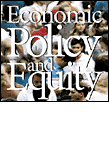 About F&D Subscribe Back Issues Write Us Copyright Information Use the free Adobe Acrobat Reader to view a pdf file of this article
|
Letter from the editor A COUNTRY whose economy is stagnant or shrinking has little hope of improving the lives of its people. Strong economic growth is a prerequisite for raising incomes and living standards. But everyone may not benefit equally from such growth. In the lead article, the staff of the IMF's Fiscal Affairs Department discuss whether globalization and technological progress have contributed to widening income gaps between skilled and unskilled workers and explore some strategies policymakers might adopt to deal with this disturbing trend. Vito Tanzi then summarizes the conclusions of a conference held at the IMF in June, in which the participants studied the causes of growing income inequality and addressed the complex question of how to use economic policy to make societies more equitable. These two articles stress the importance of sound macroeconomic policies to spur growth and curb inflation, and highlight the contribution public spending on health and education can make to improving the lot of the poor, a theme that is elaborated by Sanjeev Gupta, Benedict Clements, and Erwin Tiongson. Philip Gerson examines these issues as they apply to the Philippines, a country that has suffered from persistent poverty. It is now more than a year since the Asian crisis broke. Its far-reaching impact on regions other than Asia is discussed by the directors of the IMF's area departments. An article by the Expenditure Policy Division of the IMF's Fiscal Affairs Department describes the measures being taken by Indonesia, Korea, and Thailand—the countries hit the hardest by the crisis—to protect their most vulnerable citizens while they get their economies back on track. Nearly ten years have passed since the formerly centrally planned economies began their transition to market systems. Patrick Lenain reviews the progress the transition countries have made in reducing external imbalances, establishing monetary stability, and integrating into the international economy. Julian Exeter and Steven Fries look at how far these countries have come in laying the foundations for a market economy, through liberalizing markets, privatizing state enterprises, and building a strong financial sector. Russia and other former Soviet Union countries are major producers of oil and gas. Dale Gray focuses on how these countries can reform their energy sectors to make them more efficient, increase tax revenues, and encourage foreign investment. Christoph Rosenberg and Tapio Saavalainen discuss how Azerbaijan can maximize the profits from its booming oil sector while managing the potential risks. Fresh light is shed on the story of one of the founding fathers of the IMF by James Boughton in his article on Harry Dexter White. His article is particularly timely, as this August marked the fiftieth anniversary of White's premature death from a heart attack. Finally, Jan Aart Scholte traces the recent evolution of the IMF as it seeks a more open dialogue with civil society, and recommends a range of actions to deepen this dialogue. Ian S. McDonald
|